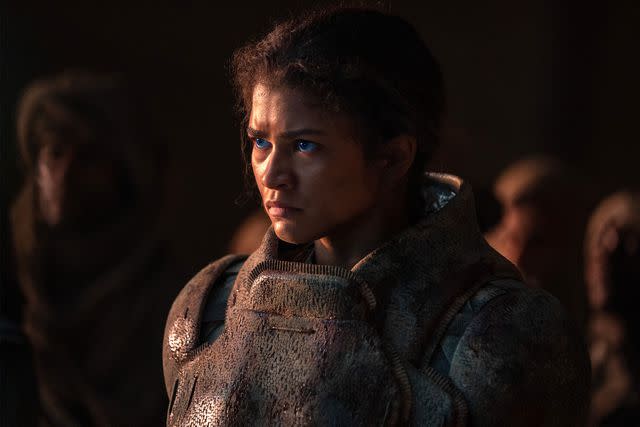How the “Dune: Part 2” ending sets up “Dune Messiah”

Director Denis Villeneuve's new film finishes a little differently than Frank Herbert's original novel. Here's what that could mean for the characters.
Warning: This article contains major spoilers from Dune: Part Two.
As the 166-minute runtime of Dune: Part Two nears its end, important events happen in rapid succession — and some differ from the source material. So let’s take a beat to explain what goes on, and what it could mean for a possible third film.
Paul Atreides (Timothée Chalamet) perfectly executes his attack plan on the Emperor (Christopher Walken). The imperial troops, known as Sardaukar, are supposed to be the most unstoppable fighting force in the universe, but even they fall before the Fremen and their sandworms. It helps, of course, that their assault is aided by the atomic weapons of House Atreides.
In the universe of Dune, every noble house has a nuclear arsenal (since these great families have essentially taken the place of nation-states) but are forbidden from using them against each other. Paul cleverly subverts this rule by using the atomic weapons to destroy the fortifications around Arrakeen, allowing easier passage for the sandworms. Paul then kills Baron Vladimir Harkonnen (Stellan Skarsgard), an act that is performed by his sister Alia in Frank Herbert’s original novel.
But when Paul moves to strike down the Emperor for taking the Harkonnen side against House Atreides — which is a great crime in the Dune universe, because the Emperor and his Sardaukar are supposed to remain neutral in the various inter-house conflicts — Feyd-Rautha Harkonnen (Austin Butler) steps between them. Like Westeros in Game of Thrones, the world of Dune has a tradition of honor duels, when someone who is challenged can select a champion to take their place. So Feyd-Rautha fights for the Emperor, with the Emperor’s own blade, for all the good it does him.

Niko Tavernise/Warner Bros.
The bitter, generations-long conflict (known as “kanly”) between House Atreides and House Harkonnen finally comes to an end with total victory for the Atreides — although the Bene Gesserit have successfully preserved the genetic bloodline of House Harkonnen, thanks to the pregnancy of Lady Fenring (Lea Seydoux).
After the fall of Feyd-Rautha, things happen a little differently than the book. Paul and the Emperor’s daughter, Princess Irulan (Florence Pugh), agree to a marriage that will allow him to ascend the galactic throne and spare the former ruler’s life. What does this mean for his Fremen lover, Chani (Zendaya)? In Herbert’s novel, Chani continues to stand by Paul and bears his children, despite his marriage to another woman. But in director Denis Villeneuve’s film, Chani storms out of the building. The last shot of the film is her summoning a sandworm to take her as far away as possible.
The other Great Houses aren’t any happier about Paul’s ascension. However, despite their massed armada, they cannot attack Paul on Arrakis. You see, destroying fortifications wasn’t Paul’s only reason for deploying atomic weapons. It was also a demonstration that if anyone attacks Arrakis, Paul could easily turn his remaining nukes on the desert planet’s supply of melange — the only source of the much-needed spice in the entire universe. That leaves the noble houses on the defensive, as Paul sends his Fremen legions across the universe to subdue them.
This is the “holy war” (“jihad” in Herbert’s novel) that Paul has seen glimpses of in his horrifying visions. This war didn’t seem like such a bad thing when he and his mother were cowering from Harkonnen troops in the deep desert. Surely the Harkonnens deserved whatever was coming to them, but now the Harkonnens are dead and the war is only just beginning. Many millions of people who had nothing to do with the massacre of Paul’s family are going to pay the ultimate price.

Just as tragic is the way Paul has manipulated the Fremen. He became their leader, the “Lisan al-Gaib,” by claiming that he was going to fulfill the long-held Fremen dream of terraforming the desserts of Arrakis into a green paradise. At the end we hear him order his troops to “take them to Paradise!” Although Stilgar (Javier Bardem) and the others are passionately enthusiastic about this violent campaign, the meaning has clearly been changed in a horrible way. Instead of taking the Fremen to their promised paradise on Arrakis, now Paul is taking them and his enemies to the afterlife.
Don’t expect to see this war on screen, though. Though a third Dune film has not been formally announced, Villeneuve has said he next wants to adapt Herbert’s follow-up novel Dune Messiah. By the time that story begins, Paul has secured his place as dictator of the universe, though he’s made quite a few enemies in the process. The resistance will move from the battlefield to the shadowy chambers of conspiracy, and unlike in the novel, it looks like Paul will have to deal with rebellion even closer to home, if Chani has anything to say about it.
“When Frank Herbert wrote Dune, he was disappointed at how people perceived Paul,” Villeneuve says. “In his mind, Dune was a cautionary tale — a warning against charismatic figures. He felt that Paul was perceived as a hero, when he wanted to do the opposite. So in order to correct that, he wrote Dune Messiah, a kind of epilogue that makes it very clear this story is not a victory, it’s a tragedy.”
Dune: Part Two is now playing in theaters.
Want more movie news? Sign up for Entertainment Weekly's free newsletter to get the latest trailers, celebrity interviews, film reviews, and more.
Related content:
Read the original article on Entertainment Weekly.

 Yahoo News
Yahoo News 
